International Marketing Strategies and Cultural Impact Analysis Report
VerifiedAdded on 2022/09/29
|7
|1609
|23
Report
AI Summary
This report examines the significant impact of culture on international marketing strategies. It defines culture as the shared values, beliefs, and perceptions passed down through generations, emphasizing its crucial role in global marketing. The report delves into cultural elements such as social institutions, religion, values, norms, and education, illustrating their influence on marketing strategies with examples. It highlights how companies must adapt their approaches to resonate with target markets' unique cultural contexts, impacting language, religion, and societal values. The analysis underscores the positive effects of understanding cultural nuances, leading to stronger brand positions and effective marketing campaigns. By studying values, attitudes, and consumer preferences, international firms can tailor policies and advertisements to align with local cultures. The report concludes that a deep understanding of cultural elements is essential for successful international marketing, impacting communication, brand image, and customer relationships.
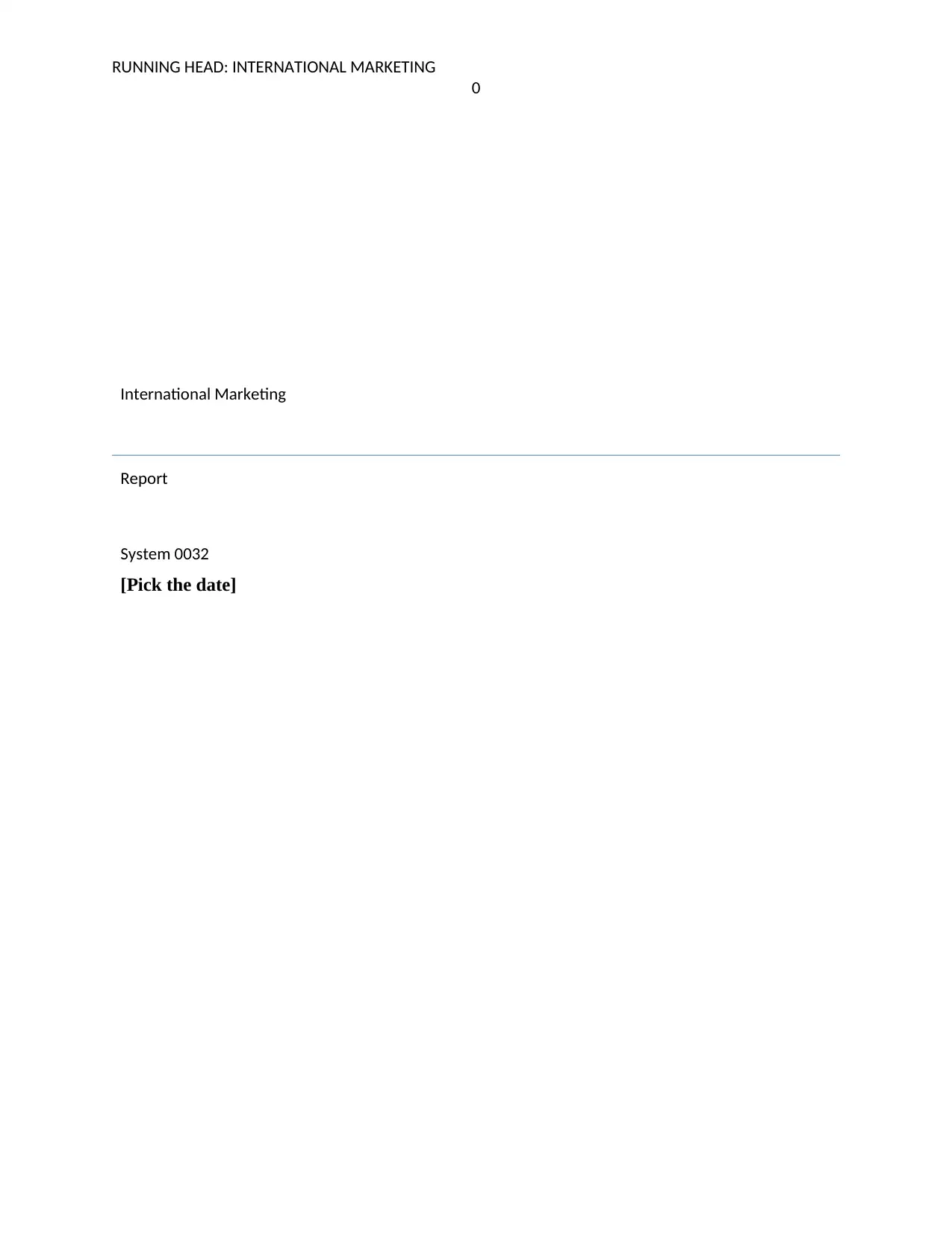
RUNNING HEAD: INTERNATIONAL MARKETING
0
International Marketing
Report
System 0032
[Pick the date]
0
International Marketing
Report
System 0032
[Pick the date]
Paraphrase This Document
Need a fresh take? Get an instant paraphrase of this document with our AI Paraphraser
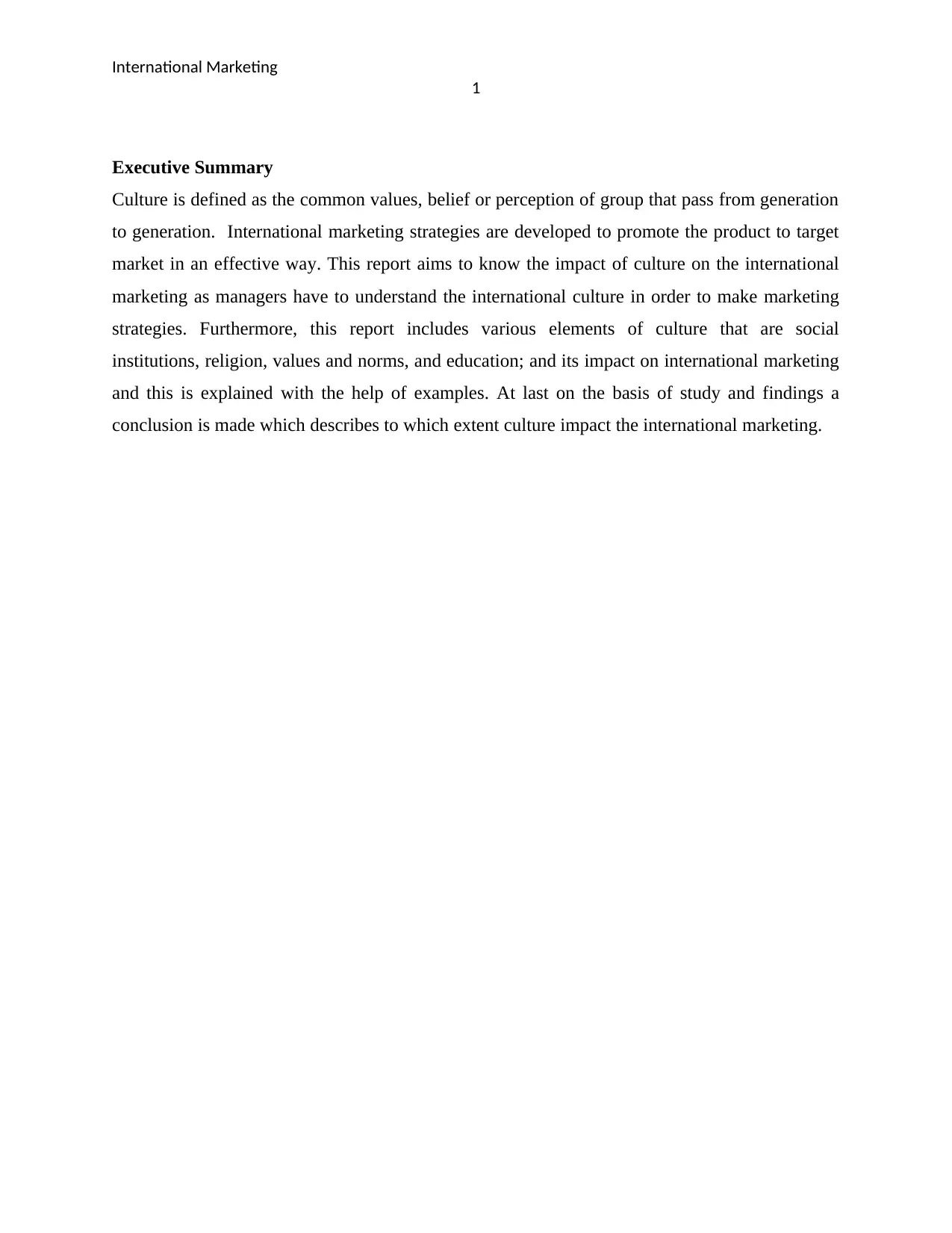
International Marketing
1
Executive Summary
Culture is defined as the common values, belief or perception of group that pass from generation
to generation. International marketing strategies are developed to promote the product to target
market in an effective way. This report aims to know the impact of culture on the international
marketing as managers have to understand the international culture in order to make marketing
strategies. Furthermore, this report includes various elements of culture that are social
institutions, religion, values and norms, and education; and its impact on international marketing
and this is explained with the help of examples. At last on the basis of study and findings a
conclusion is made which describes to which extent culture impact the international marketing.
1
Executive Summary
Culture is defined as the common values, belief or perception of group that pass from generation
to generation. International marketing strategies are developed to promote the product to target
market in an effective way. This report aims to know the impact of culture on the international
marketing as managers have to understand the international culture in order to make marketing
strategies. Furthermore, this report includes various elements of culture that are social
institutions, religion, values and norms, and education; and its impact on international marketing
and this is explained with the help of examples. At last on the basis of study and findings a
conclusion is made which describes to which extent culture impact the international marketing.
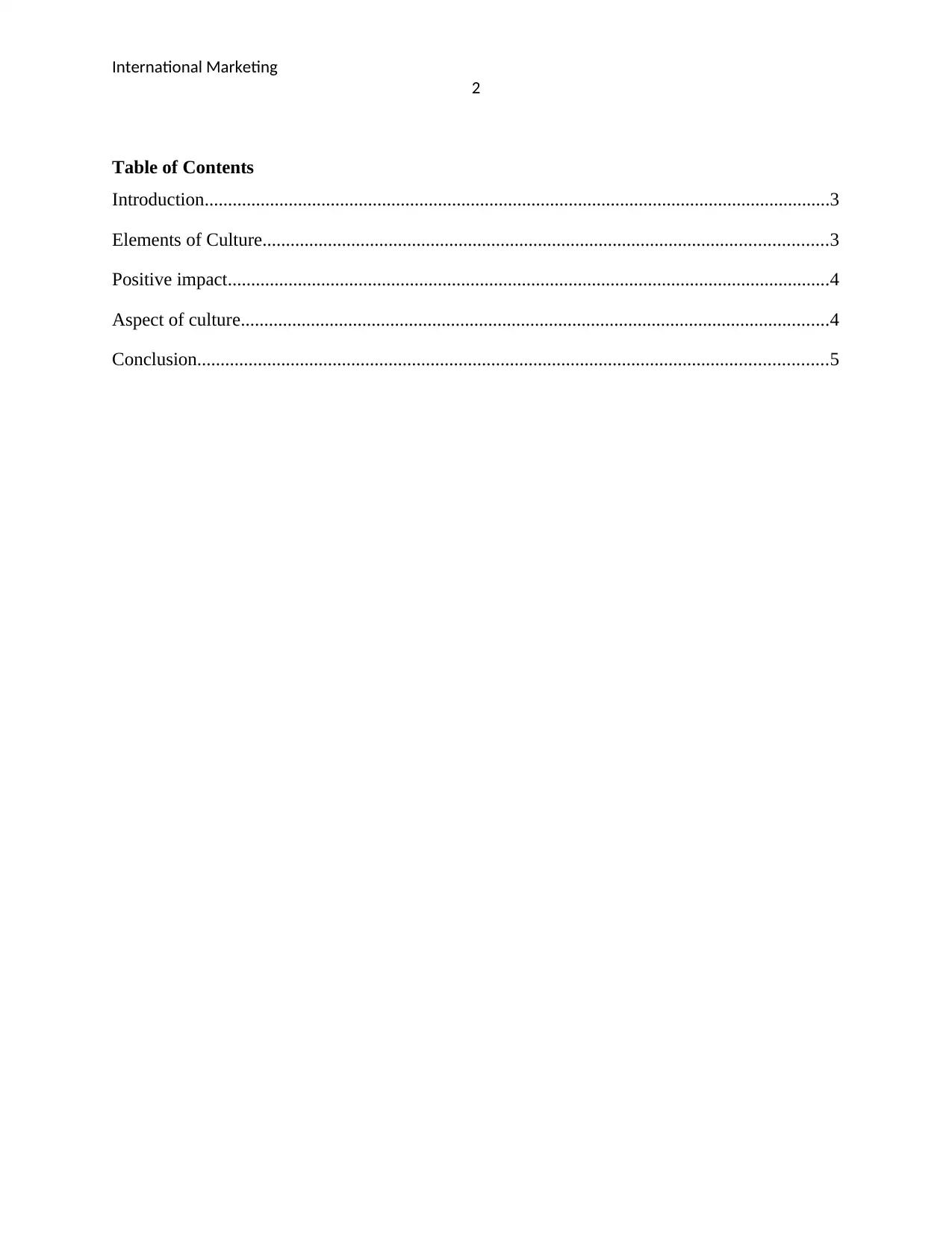
International Marketing
2
Table of Contents
Introduction......................................................................................................................................3
Elements of Culture.........................................................................................................................3
Positive impact.................................................................................................................................4
Aspect of culture..............................................................................................................................4
Conclusion.......................................................................................................................................5
2
Table of Contents
Introduction......................................................................................................................................3
Elements of Culture.........................................................................................................................3
Positive impact.................................................................................................................................4
Aspect of culture..............................................................................................................................4
Conclusion.......................................................................................................................................5
⊘ This is a preview!⊘
Do you want full access?
Subscribe today to unlock all pages.

Trusted by 1+ million students worldwide
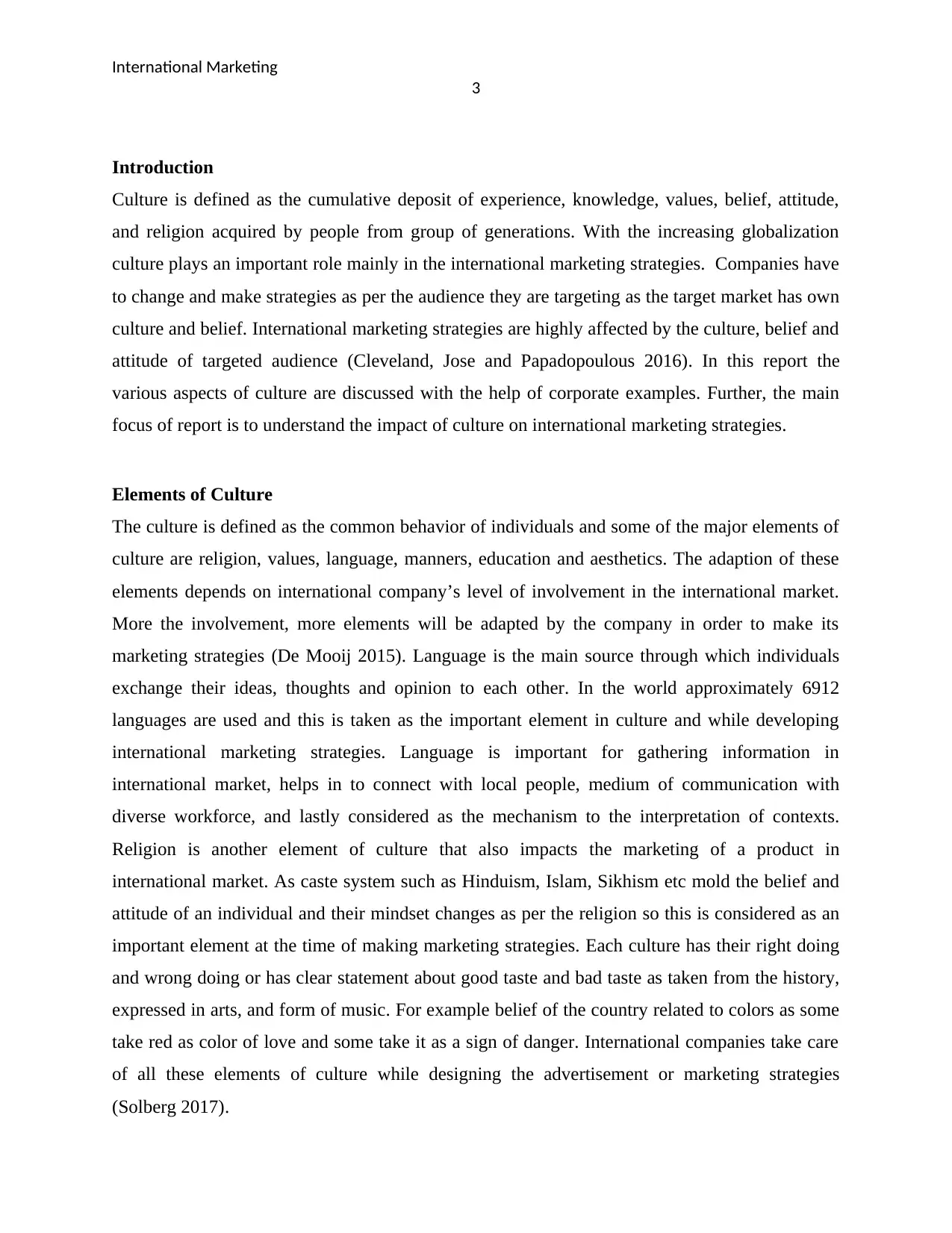
International Marketing
3
Introduction
Culture is defined as the cumulative deposit of experience, knowledge, values, belief, attitude,
and religion acquired by people from group of generations. With the increasing globalization
culture plays an important role mainly in the international marketing strategies. Companies have
to change and make strategies as per the audience they are targeting as the target market has own
culture and belief. International marketing strategies are highly affected by the culture, belief and
attitude of targeted audience (Cleveland, Jose and Papadopoulous 2016). In this report the
various aspects of culture are discussed with the help of corporate examples. Further, the main
focus of report is to understand the impact of culture on international marketing strategies.
Elements of Culture
The culture is defined as the common behavior of individuals and some of the major elements of
culture are religion, values, language, manners, education and aesthetics. The adaption of these
elements depends on international company’s level of involvement in the international market.
More the involvement, more elements will be adapted by the company in order to make its
marketing strategies (De Mooij 2015). Language is the main source through which individuals
exchange their ideas, thoughts and opinion to each other. In the world approximately 6912
languages are used and this is taken as the important element in culture and while developing
international marketing strategies. Language is important for gathering information in
international market, helps in to connect with local people, medium of communication with
diverse workforce, and lastly considered as the mechanism to the interpretation of contexts.
Religion is another element of culture that also impacts the marketing of a product in
international market. As caste system such as Hinduism, Islam, Sikhism etc mold the belief and
attitude of an individual and their mindset changes as per the religion so this is considered as an
important element at the time of making marketing strategies. Each culture has their right doing
and wrong doing or has clear statement about good taste and bad taste as taken from the history,
expressed in arts, and form of music. For example belief of the country related to colors as some
take red as color of love and some take it as a sign of danger. International companies take care
of all these elements of culture while designing the advertisement or marketing strategies
(Solberg 2017).
3
Introduction
Culture is defined as the cumulative deposit of experience, knowledge, values, belief, attitude,
and religion acquired by people from group of generations. With the increasing globalization
culture plays an important role mainly in the international marketing strategies. Companies have
to change and make strategies as per the audience they are targeting as the target market has own
culture and belief. International marketing strategies are highly affected by the culture, belief and
attitude of targeted audience (Cleveland, Jose and Papadopoulous 2016). In this report the
various aspects of culture are discussed with the help of corporate examples. Further, the main
focus of report is to understand the impact of culture on international marketing strategies.
Elements of Culture
The culture is defined as the common behavior of individuals and some of the major elements of
culture are religion, values, language, manners, education and aesthetics. The adaption of these
elements depends on international company’s level of involvement in the international market.
More the involvement, more elements will be adapted by the company in order to make its
marketing strategies (De Mooij 2015). Language is the main source through which individuals
exchange their ideas, thoughts and opinion to each other. In the world approximately 6912
languages are used and this is taken as the important element in culture and while developing
international marketing strategies. Language is important for gathering information in
international market, helps in to connect with local people, medium of communication with
diverse workforce, and lastly considered as the mechanism to the interpretation of contexts.
Religion is another element of culture that also impacts the marketing of a product in
international market. As caste system such as Hinduism, Islam, Sikhism etc mold the belief and
attitude of an individual and their mindset changes as per the religion so this is considered as an
important element at the time of making marketing strategies. Each culture has their right doing
and wrong doing or has clear statement about good taste and bad taste as taken from the history,
expressed in arts, and form of music. For example belief of the country related to colors as some
take red as color of love and some take it as a sign of danger. International companies take care
of all these elements of culture while designing the advertisement or marketing strategies
(Solberg 2017).
Paraphrase This Document
Need a fresh take? Get an instant paraphrase of this document with our AI Paraphraser
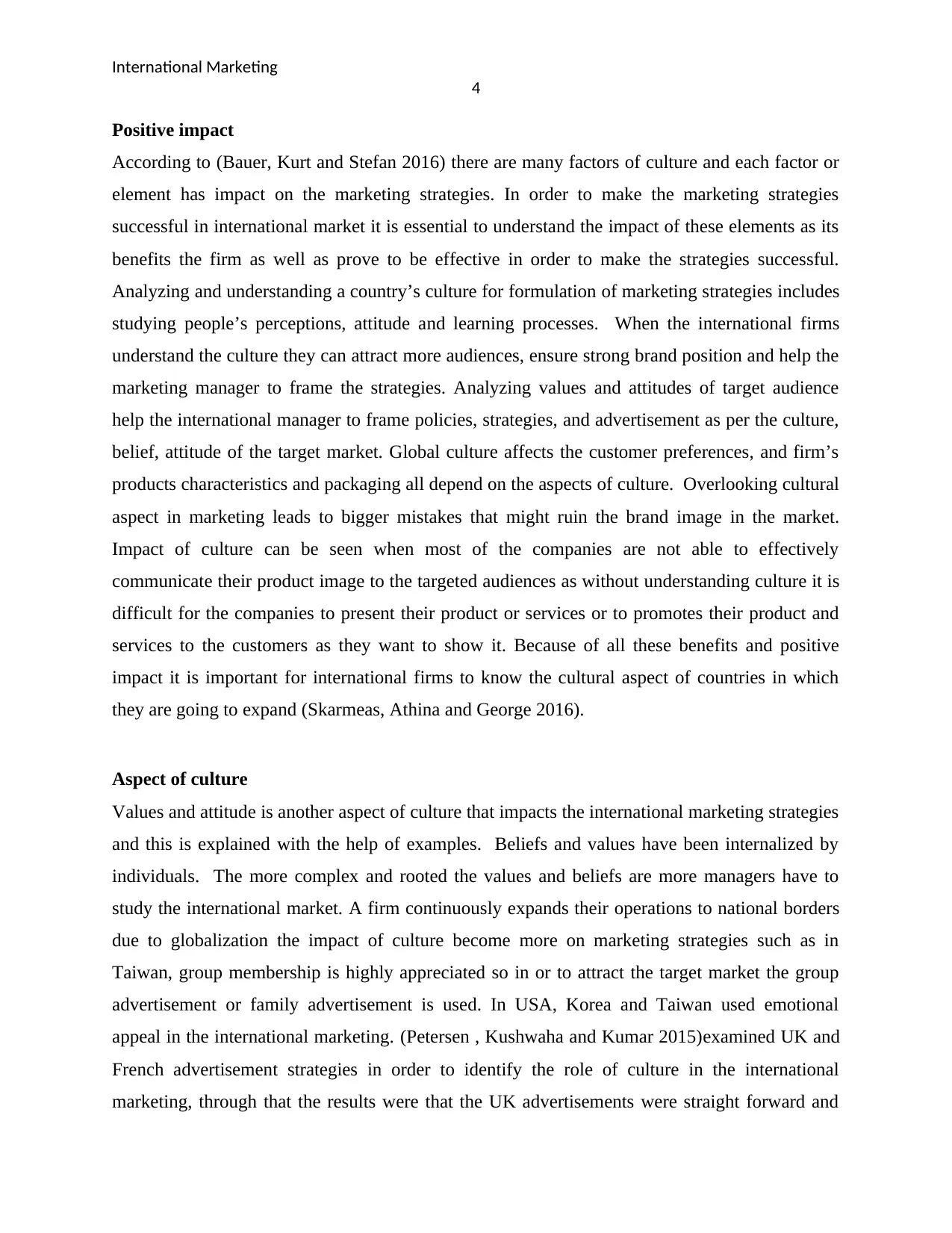
International Marketing
4
Positive impact
According to (Bauer, Kurt and Stefan 2016) there are many factors of culture and each factor or
element has impact on the marketing strategies. In order to make the marketing strategies
successful in international market it is essential to understand the impact of these elements as its
benefits the firm as well as prove to be effective in order to make the strategies successful.
Analyzing and understanding a country’s culture for formulation of marketing strategies includes
studying people’s perceptions, attitude and learning processes. When the international firms
understand the culture they can attract more audiences, ensure strong brand position and help the
marketing manager to frame the strategies. Analyzing values and attitudes of target audience
help the international manager to frame policies, strategies, and advertisement as per the culture,
belief, attitude of the target market. Global culture affects the customer preferences, and firm’s
products characteristics and packaging all depend on the aspects of culture. Overlooking cultural
aspect in marketing leads to bigger mistakes that might ruin the brand image in the market.
Impact of culture can be seen when most of the companies are not able to effectively
communicate their product image to the targeted audiences as without understanding culture it is
difficult for the companies to present their product or services or to promotes their product and
services to the customers as they want to show it. Because of all these benefits and positive
impact it is important for international firms to know the cultural aspect of countries in which
they are going to expand (Skarmeas, Athina and George 2016).
Aspect of culture
Values and attitude is another aspect of culture that impacts the international marketing strategies
and this is explained with the help of examples. Beliefs and values have been internalized by
individuals. The more complex and rooted the values and beliefs are more managers have to
study the international market. A firm continuously expands their operations to national borders
due to globalization the impact of culture become more on marketing strategies such as in
Taiwan, group membership is highly appreciated so in or to attract the target market the group
advertisement or family advertisement is used. In USA, Korea and Taiwan used emotional
appeal in the international marketing. (Petersen , Kushwaha and Kumar 2015)examined UK and
French advertisement strategies in order to identify the role of culture in the international
marketing, through that the results were that the UK advertisements were straight forward and
4
Positive impact
According to (Bauer, Kurt and Stefan 2016) there are many factors of culture and each factor or
element has impact on the marketing strategies. In order to make the marketing strategies
successful in international market it is essential to understand the impact of these elements as its
benefits the firm as well as prove to be effective in order to make the strategies successful.
Analyzing and understanding a country’s culture for formulation of marketing strategies includes
studying people’s perceptions, attitude and learning processes. When the international firms
understand the culture they can attract more audiences, ensure strong brand position and help the
marketing manager to frame the strategies. Analyzing values and attitudes of target audience
help the international manager to frame policies, strategies, and advertisement as per the culture,
belief, attitude of the target market. Global culture affects the customer preferences, and firm’s
products characteristics and packaging all depend on the aspects of culture. Overlooking cultural
aspect in marketing leads to bigger mistakes that might ruin the brand image in the market.
Impact of culture can be seen when most of the companies are not able to effectively
communicate their product image to the targeted audiences as without understanding culture it is
difficult for the companies to present their product or services or to promotes their product and
services to the customers as they want to show it. Because of all these benefits and positive
impact it is important for international firms to know the cultural aspect of countries in which
they are going to expand (Skarmeas, Athina and George 2016).
Aspect of culture
Values and attitude is another aspect of culture that impacts the international marketing strategies
and this is explained with the help of examples. Beliefs and values have been internalized by
individuals. The more complex and rooted the values and beliefs are more managers have to
study the international market. A firm continuously expands their operations to national borders
due to globalization the impact of culture become more on marketing strategies such as in
Taiwan, group membership is highly appreciated so in or to attract the target market the group
advertisement or family advertisement is used. In USA, Korea and Taiwan used emotional
appeal in the international marketing. (Petersen , Kushwaha and Kumar 2015)examined UK and
French advertisement strategies in order to identify the role of culture in the international
marketing, through that the results were that the UK advertisements were straight forward and
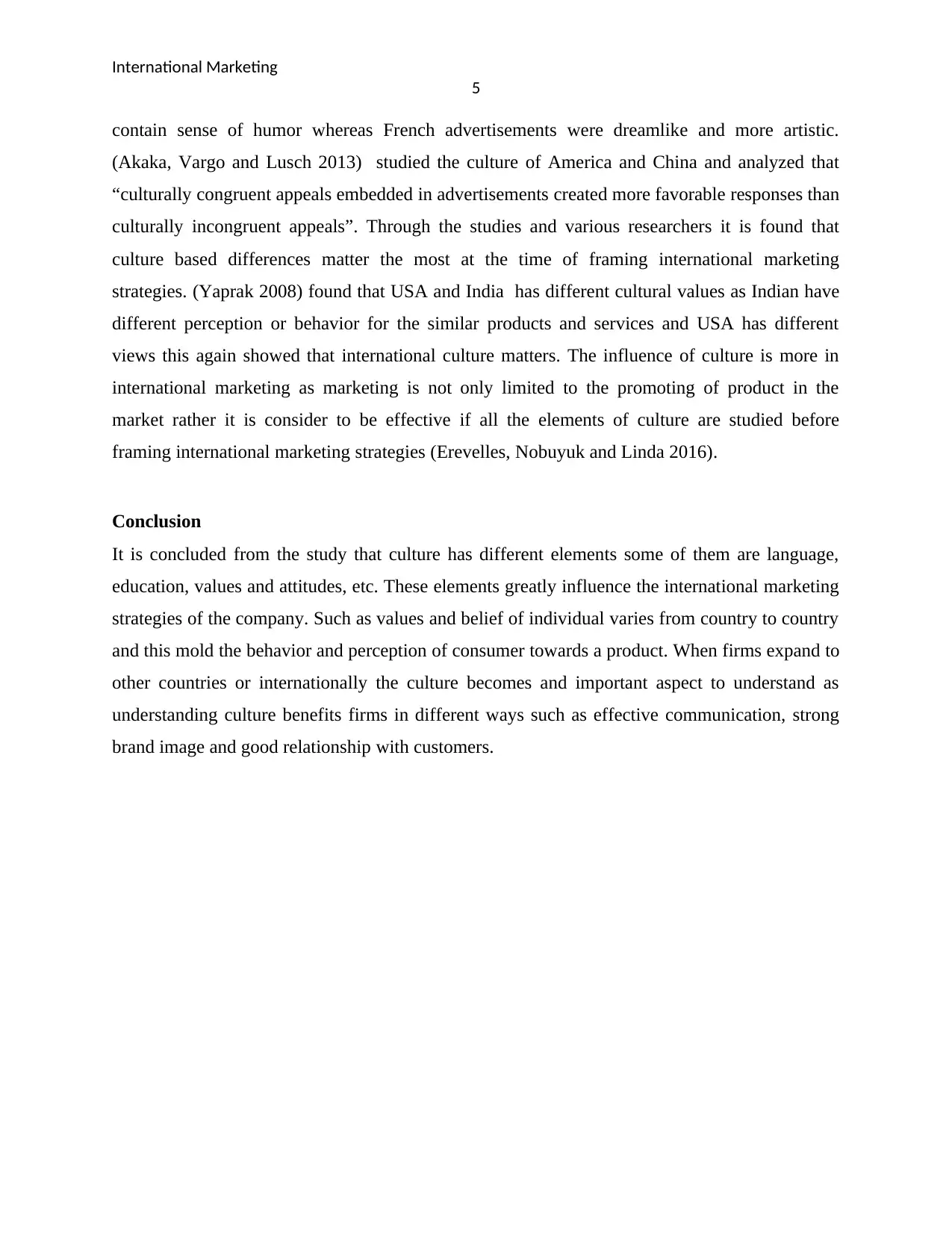
International Marketing
5
contain sense of humor whereas French advertisements were dreamlike and more artistic.
(Akaka, Vargo and Lusch 2013) studied the culture of America and China and analyzed that
“culturally congruent appeals embedded in advertisements created more favorable responses than
culturally incongruent appeals”. Through the studies and various researchers it is found that
culture based differences matter the most at the time of framing international marketing
strategies. (Yaprak 2008) found that USA and India has different cultural values as Indian have
different perception or behavior for the similar products and services and USA has different
views this again showed that international culture matters. The influence of culture is more in
international marketing as marketing is not only limited to the promoting of product in the
market rather it is consider to be effective if all the elements of culture are studied before
framing international marketing strategies (Erevelles, Nobuyuk and Linda 2016).
Conclusion
It is concluded from the study that culture has different elements some of them are language,
education, values and attitudes, etc. These elements greatly influence the international marketing
strategies of the company. Such as values and belief of individual varies from country to country
and this mold the behavior and perception of consumer towards a product. When firms expand to
other countries or internationally the culture becomes and important aspect to understand as
understanding culture benefits firms in different ways such as effective communication, strong
brand image and good relationship with customers.
5
contain sense of humor whereas French advertisements were dreamlike and more artistic.
(Akaka, Vargo and Lusch 2013) studied the culture of America and China and analyzed that
“culturally congruent appeals embedded in advertisements created more favorable responses than
culturally incongruent appeals”. Through the studies and various researchers it is found that
culture based differences matter the most at the time of framing international marketing
strategies. (Yaprak 2008) found that USA and India has different cultural values as Indian have
different perception or behavior for the similar products and services and USA has different
views this again showed that international culture matters. The influence of culture is more in
international marketing as marketing is not only limited to the promoting of product in the
market rather it is consider to be effective if all the elements of culture are studied before
framing international marketing strategies (Erevelles, Nobuyuk and Linda 2016).
Conclusion
It is concluded from the study that culture has different elements some of them are language,
education, values and attitudes, etc. These elements greatly influence the international marketing
strategies of the company. Such as values and belief of individual varies from country to country
and this mold the behavior and perception of consumer towards a product. When firms expand to
other countries or internationally the culture becomes and important aspect to understand as
understanding culture benefits firms in different ways such as effective communication, strong
brand image and good relationship with customers.
⊘ This is a preview!⊘
Do you want full access?
Subscribe today to unlock all pages.

Trusted by 1+ million students worldwide
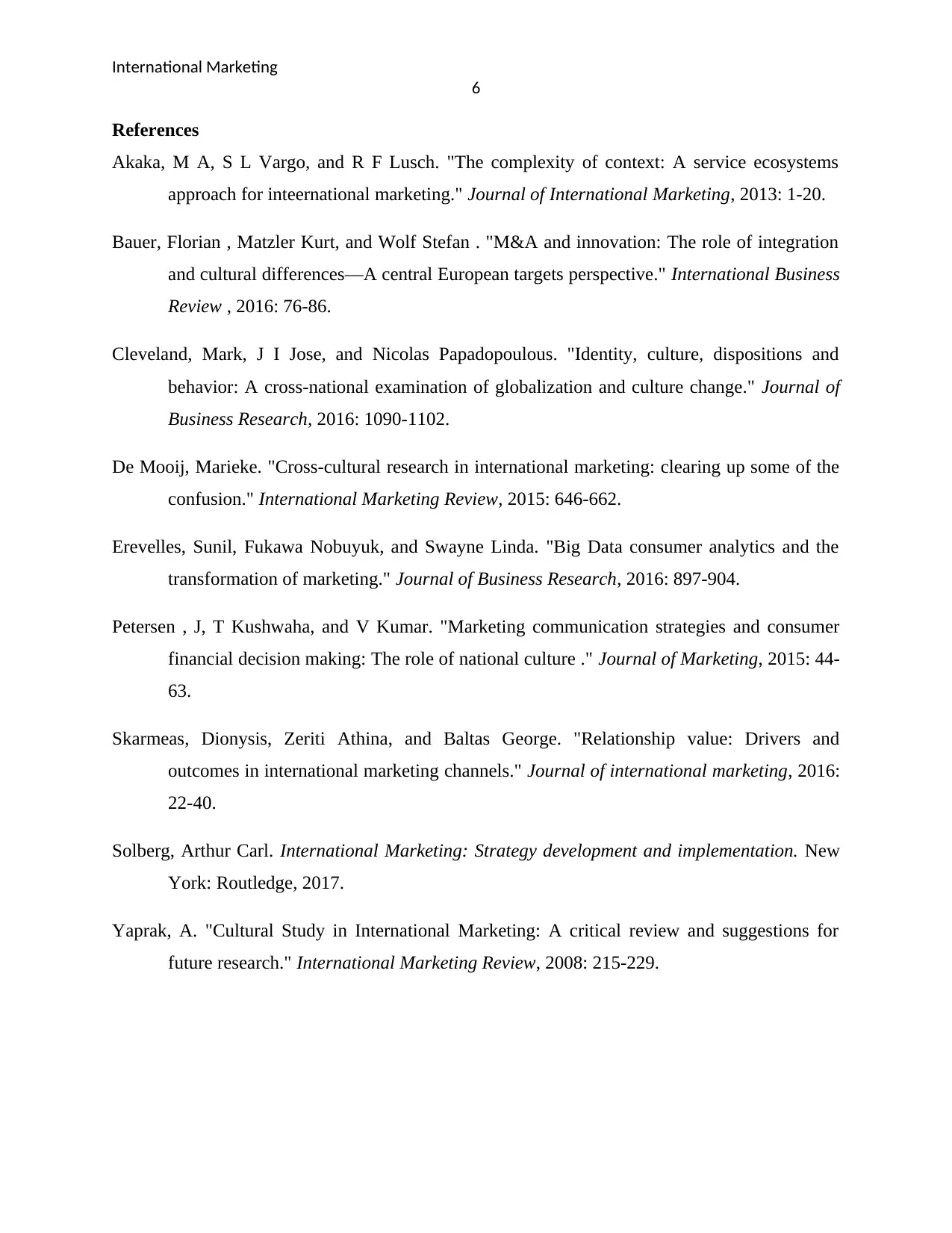
International Marketing
6
References
Akaka, M A, S L Vargo, and R F Lusch. "The complexity of context: A service ecosystems
approach for inteernational marketing." Journal of International Marketing, 2013: 1-20.
Bauer, Florian , Matzler Kurt, and Wolf Stefan . "M&A and innovation: The role of integration
and cultural differences—A central European targets perspective." International Business
Review , 2016: 76-86.
Cleveland, Mark, J I Jose, and Nicolas Papadopoulous. "Identity, culture, dispositions and
behavior: A cross-national examination of globalization and culture change." Journal of
Business Research, 2016: 1090-1102.
De Mooij, Marieke. "Cross-cultural research in international marketing: clearing up some of the
confusion." International Marketing Review, 2015: 646-662.
Erevelles, Sunil, Fukawa Nobuyuk, and Swayne Linda. "Big Data consumer analytics and the
transformation of marketing." Journal of Business Research, 2016: 897-904.
Petersen , J, T Kushwaha, and V Kumar. "Marketing communication strategies and consumer
financial decision making: The role of national culture ." Journal of Marketing, 2015: 44-
63.
Skarmeas, Dionysis, Zeriti Athina, and Baltas George. "Relationship value: Drivers and
outcomes in international marketing channels." Journal of international marketing, 2016:
22-40.
Solberg, Arthur Carl. International Marketing: Strategy development and implementation. New
York: Routledge, 2017.
Yaprak, A. "Cultural Study in International Marketing: A critical review and suggestions for
future research." International Marketing Review, 2008: 215-229.
6
References
Akaka, M A, S L Vargo, and R F Lusch. "The complexity of context: A service ecosystems
approach for inteernational marketing." Journal of International Marketing, 2013: 1-20.
Bauer, Florian , Matzler Kurt, and Wolf Stefan . "M&A and innovation: The role of integration
and cultural differences—A central European targets perspective." International Business
Review , 2016: 76-86.
Cleveland, Mark, J I Jose, and Nicolas Papadopoulous. "Identity, culture, dispositions and
behavior: A cross-national examination of globalization and culture change." Journal of
Business Research, 2016: 1090-1102.
De Mooij, Marieke. "Cross-cultural research in international marketing: clearing up some of the
confusion." International Marketing Review, 2015: 646-662.
Erevelles, Sunil, Fukawa Nobuyuk, and Swayne Linda. "Big Data consumer analytics and the
transformation of marketing." Journal of Business Research, 2016: 897-904.
Petersen , J, T Kushwaha, and V Kumar. "Marketing communication strategies and consumer
financial decision making: The role of national culture ." Journal of Marketing, 2015: 44-
63.
Skarmeas, Dionysis, Zeriti Athina, and Baltas George. "Relationship value: Drivers and
outcomes in international marketing channels." Journal of international marketing, 2016:
22-40.
Solberg, Arthur Carl. International Marketing: Strategy development and implementation. New
York: Routledge, 2017.
Yaprak, A. "Cultural Study in International Marketing: A critical review and suggestions for
future research." International Marketing Review, 2008: 215-229.
1 out of 7
Related Documents
Your All-in-One AI-Powered Toolkit for Academic Success.
+13062052269
info@desklib.com
Available 24*7 on WhatsApp / Email
![[object Object]](/_next/static/media/star-bottom.7253800d.svg)
Unlock your academic potential
Copyright © 2020–2025 A2Z Services. All Rights Reserved. Developed and managed by ZUCOL.





